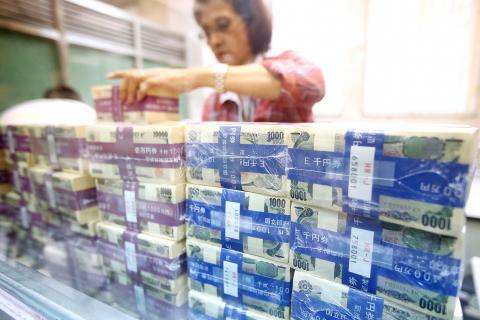Bank of Taiwan (臺灣銀行), the nation’s biggest lender, yesterday said its yen supplies are more than adequate to meet a surge in demand, after people on Thursday flocked to the Japanese currency to capitalize on its weakness against the New Taiwan dollar.
The state-owned bank said that it placed ¥600 million (US$5.35 million) in cash at its headquarters in Taipei yesterday morning, denying a news report that it was experiencing a shortfall of yen after a sudden surge in demand a day earlier.
The bank said the figure was only a small fraction of its yen supplies.

Photo: CNA
On Thursday, the yen fell to a low of NT$0.2691 during intraday trading, the lowest in 18 months, triggering buying by people planning to visit Japan.
The Chinese-language China Times reported that the bank sold ¥10 billion on Thursday — its largest daily yen sale — which the paper said caused a shortage in supply and forced it to seek help from foreign banks.
The yen yesterday regained its footing against the NT dollar, rising to between NT$0.270 and NT$0.272, as the NT dollar fell against the US dollar amid fears that the US Federal Reserve would hike interest rates next month.
Bank of Taiwan said some of its branches had only between ¥60 million and ¥100 million in cash, and that they asked for additional supplies from the bank’s headquarters.
The bank denied it sought help from foreign lenders to boost its yen supplies.
The yen weakened because traders moved funds out of the Japanese currency to other regional units amid easing concerns over geopolitical tensions, dealers said.
They said NT$0.27 was a psychological level for the yen and selling intensified on the local foreign-exchange market after the Japanese currency fell below that level on Thursday.
Other banks that offer relatively better exchange rates for the yen, such as Mega International Commercial Bank (兆豐國際商銀), Bank SinoPac (永豐銀行) and E.Sun Commercial Bank (玉山銀行), said they also saw robust demand for the Japanese currency.

POWERING UP: PSUs for AI servers made up about 50% of Delta’s total server PSU revenue during the first three quarters of last year, the company said Power supply and electronic components maker Delta Electronics Inc (台達電) reported record-high revenue of NT$161.61 billion (US$5.11 billion) for last quarter and said it remains positive about this quarter. Last quarter’s figure was up 7.6 percent from the previous quarter and 41.51 percent higher than a year earlier, and largely in line with Yuanta Securities Investment Consulting Co’s (元大投顧) forecast of NT$160 billion. Delta’s annual revenue last year rose 31.76 percent year-on-year to NT$554.89 billion, also a record high for the company. Its strong performance reflected continued demand for high-performance power solutions and advanced liquid-cooling products used in artificial intelligence (AI) data centers,

SIZE MATTERS: TSMC started phasing out 8-inch wafer production last year, while Samsung is more aggressively retiring 8-inch capacity, TrendForce said Chipmakers are expected to raise prices of 8-inch wafers by up to 20 percent this year on concern over supply constraints as major contract chipmakers Taiwan Semiconductor Manufacturing Co (TSMC, 台積電) and Samsung Electronics Co gradually retire less advanced wafer capacity, TrendForce Corp (集邦科技) said yesterday. It is the first significant across-the-board price hike since a global semiconductor correction in 2023, the Taipei-based market researcher said in a report. Global 8-inch wafer capacity slid 0.3 percent year-on-year last year, although 8-inch wafer prices still hovered at relatively stable levels throughout the year, TrendForce said. The downward trend is expected to continue this year,

Vincent Wei led fellow Singaporean farmers around an empty Malaysian plot, laying out plans for a greenhouse and rows of leafy vegetables. What he pitched was not just space for crops, but a lifeline for growers struggling to make ends meet in a city-state with high prices and little vacant land. The future agriculture hub is part of a joint special economic zone launched last year by the two neighbors, expected to cost US$123 million and produce 10,000 tonnes of fresh produce annually. It is attracting Singaporean farmers with promises of cheaper land, labor and energy just over the border.

US actor Matthew McConaughey has filed recordings of his image and voice with US patent authorities to protect them from unauthorized usage by artificial intelligence (AI) platforms, a representative said earlier this week. Several video clips and audio recordings were registered by the commercial arm of the Just Keep Livin’ Foundation, a non-profit created by the Oscar-winning actor and his wife, Camila, according to the US Patent and Trademark Office database. Many artists are increasingly concerned about the uncontrolled use of their image via generative AI since the rollout of ChatGPT and other AI-powered tools. Several US states have adopted